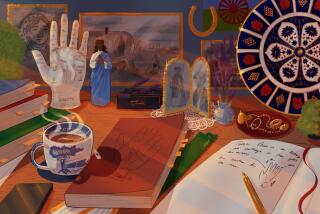Step on a Crack . . . : If You Sneeze 4 Times in a Row, Look Out for Falling Stars
- Share via
It’s not what is, it’s what people think it is. And people, ever since they chipped drawings of saber-tooth tigers on dark cave walls, have clung to strange notions and perplexing superstitions.
At the Center for American Popular Beliefs and Superstitions at UCLA, described as the largest archive of its kind, man’s eternal quest to make sense of the senseless is well documented.
Many of the evolving and dissolving legends and myths originated in this country, but most were born in the Old World and transferred to the United States. A sample of those that mystify and delight Americans includes:
Pare an apple and toss it over your shoulder and the peel that falls to the ground will form the first letter of the person you will someday marry.
If you sneeze four times in a row, you will die. Hence the expression “God bless you.”
A shooting star means that someone has died.
If a woman eats chalk while she is pregnant, a miscarriage will occur.
When you drop lead into cold water, it will form a figure resembling your future. If it forms a coffin, it means that your husband will become an undertaker.
If your lover has betrayed you, write his or her name on a candle and burn it. He or she will slowly dissolve, become ill or die.
If you put your husband’s hand in a pail of water while he is sleeping, he will tell all.
If you eat a piece of candy or cake before going to bed, you’ll dream of snakes.
Professor Emeritus Wayland Hand, who started the UCLA archive 45 years ago, is something of a legend himself. The small, scholarly, white-haired man is a figure out of “Goodbye, Mr. Chips.” The archive in the musty basement of Kensey Hall is his laboratory, his life, his love.
‘Want to Believe’
Hand taught folklore and mythology until he retired in 1974. He still keeps regular hours at the archive. He gets little money to run the center, and that is used to support a few research assistants. Collecting and compiling the confounding are what Hand does best.
“People want to believe in these things, in these myths,” Hand said as he moved about the crowded room opening thick compendiums containing the strange wisdom of past and present.
“It’s not whether they’re true or false, but people want to believe in something. And it is interesting.
“In Iowa, maybe 20 or 30 years ago, they had the notion that the first person to leave the cemetery after a funeral would be the next person to die. So people would stand around and stand around until someone less familiar with the superstition left first.
“And there’s the love ritual, which I think started in Germany, about two or three girls who meet and set a table in silence. They keep a vigil until midnight and then they look in a mirror or a well, or a glass of water. And they will see their future lover.”
The Germans, Hungarians, Jewish and English lead the pack in handing down from one generation to another these peculiar perceptions, according to Hand. The Irish are not far behind.
Although the Germans offered the curious notion that if a man gives a woman yellow flowers, it means he is jealous, the Irish get the credit for banning whistling in graveyards, kissing bumps to make them well and believing that a sudden warm breeze means the passing of a ghost.
Bells Will Not Ring
The Irish also devised the suspicion that if you try on someone else’s engagement ring, you’ll remain single the rest of your life.
The practice of avoiding the cracks in the sidewalk is complements of the English, along with the belief--probably shared by few--that if the sun shines while it is raining, the devil is beating his wife behind the barn door.
Hand said that no one began seriously collecting and sorting out myths and superstitions until the 19th Century.
In life fraught with chance, hazard and uncertainty, popular beliefs and superstitions cannot help but emerge, Hand said, adding that it is also a misconception to believe that only the uneducated are prone to be taken in by silly notions.
“We all need something to believe in, even if it seems a little odd or nonsensical,” Hand said.
Outside the archive, clouds are forming. Rain is imminent. And you know what that means? It means that angels are washing their hair.
More to Read
Sign up for Essential California
The most important California stories and recommendations in your inbox every morning.
You may occasionally receive promotional content from the Los Angeles Times.










